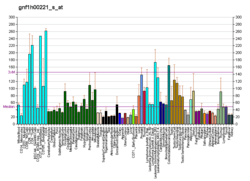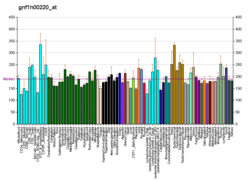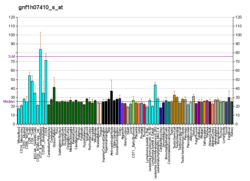ANAPC7
Anaphase-promoting complex subunit 7 is an enzyme that in humans is encoded by the ANAPC7 gene.[3] Multiple transcript variants encoding different isoforms have been found for this gene.
Function
This gene encodes a tetratricopeptide repeat containing component of the anaphase-promoting complex/cyclosome (APC/C), a large E3 ubiquitin ligase that controls cell cycle progression by targeting a number of cell cycle regulators such as B-type cyclins for 26S proteasome-mediated degradation through ubiquitination. The encoded protein is required for proper protein ubiquitination function of APC/C and for the interaction of APC/C with certain transcription coactivators.[3]
Interactions
ANAPC7 has been shown to interact with ANAPC1,[4][5] ANAPC4,[4] CDC27[4][6] and CDC20.[4][7]
References
- ↑ "Human PubMed Reference:".
- ↑ "Mouse PubMed Reference:".
- 1 2 "Entrez Gene: ANAPC7 anaphase promoting complex subunit 7".
- 1 2 3 4 Vodermaier HC, Gieffers C, Maurer-Stroh S, Eisenhaber F, Peters JM (September 2003). "TPR subunits of the anaphase-promoting complex mediate binding to the activator protein CDH1". Curr. Biol. 13 (17): 1459–68. PMID 12956947. doi:10.1016/S0960-9822(03)00581-5.
- ↑ Sumara I, Vorlaufer E, Gieffers C, Peters BH, Peters JM (November 2000). "Characterization of vertebrate cohesin complexes and their regulation in prophase". J. Cell Biol. 151 (4): 749–62. PMC 2169443
 . PMID 11076961. doi:10.1083/jcb.151.4.749.
. PMID 11076961. doi:10.1083/jcb.151.4.749. - ↑ Gmachl M, Gieffers C, Podtelejnikov AV, Mann M, Peters JM (August 2000). "The RING-H2 finger protein APC11 and the E2 enzyme UBC4 are sufficient to ubiquitinate substrates of the anaphase-promoting complex". Proc. Natl. Acad. Sci. U.S.A. 97 (16): 8973–8. PMC 16806
 . PMID 10922056. doi:10.1073/pnas.97.16.8973.
. PMID 10922056. doi:10.1073/pnas.97.16.8973. - ↑ Nilsson J, Yekezare M, Minshull J, Pines J (December 2008). "The APC/C maintains the spindle assembly checkpoint by targeting Cdc20 for destruction". Nat. Cell Biol. 10 (12): 1411–20. PMC 2635557
 . PMID 18997788. doi:10.1038/ncb1799.
. PMID 18997788. doi:10.1038/ncb1799.
External links
- Human ANAPC7 genome location and ANAPC7 gene details page in the UCSC Genome Browser.
Further reading
- Andersson B, Wentland MA, Ricafrente JY, et al. (1996). "A "double adaptor" method for improved shotgun library construction". Anal. Biochem. 236 (1): 107–13. PMID 8619474. doi:10.1006/abio.1996.0138.
- Yu W, Andersson B, Worley KC, et al. (1997). "Large-Scale Concatenation cDNA Sequencing". Genome Res. 7 (4): 353–8. PMC 139146
 . PMID 9110174. doi:10.1101/gr.7.4.353.
. PMID 9110174. doi:10.1101/gr.7.4.353. - Yu H, Peters JM, King RW, et al. (1998). "Identification of a cullin homology region in a subunit of the anaphase-promoting complex". Science. 279 (5354): 1219–22. PMID 9469815. doi:10.1126/science.279.5354.1219.
- Grossberger R, Gieffers C, Zachariae W, et al. (1999). "Characterization of the DOC1/APC10 subunit of the yeast and the human anaphase-promoting complex". J. Biol. Chem. 274 (20): 14500–7. PMID 10318877. doi:10.1074/jbc.274.20.14500.
- Chan GK, Jablonski SA, Sudakin V, et al. (1999). "Human Bubr1 Is a Mitotic Checkpoint Kinase That Monitors Cenp-E Functions at Kinetochores and Binds the Cyclosome/APC". J. Cell Biol. 146 (5): 941–54. PMC 2169490
 . PMID 10477750. doi:10.1083/jcb.146.5.941.
. PMID 10477750. doi:10.1083/jcb.146.5.941. - Gieffers C, Peters BH, Kramer ER, et al. (1999). "Expression of the CDH1-associated form of the anaphase-promoting complex in postmitotic neurons". Proc. Natl. Acad. Sci. U.S.A. 96 (20): 11317–22. PMC 18031
 . PMID 10500174. doi:10.1073/pnas.96.20.11317.
. PMID 10500174. doi:10.1073/pnas.96.20.11317. - Gmachl M, Gieffers C, Podtelejnikov AV, et al. (2000). "The RING-H2 finger protein APC11 and the E2 enzyme UBC4 are sufficient to ubiquitinate substrates of the anaphase-promoting complex". Proc. Natl. Acad. Sci. U.S.A. 97 (16): 8973–8. PMC 16806
 . PMID 10922056. doi:10.1073/pnas.97.16.8973.
. PMID 10922056. doi:10.1073/pnas.97.16.8973. - Strausberg RL, Feingold EA, Grouse LH, et al. (2003). "Generation and initial analysis of more than 15,000 full-length human and mouse cDNA sequences". Proc. Natl. Acad. Sci. U.S.A. 99 (26): 16899–903. PMC 139241
 . PMID 12477932. doi:10.1073/pnas.242603899.
. PMID 12477932. doi:10.1073/pnas.242603899. - Vodermaier HC, Gieffers C, Maurer-Stroh S, et al. (2004). "TPR subunits of the anaphase-promoting complex mediate binding to the activator protein CDH1". Curr. Biol. 13 (17): 1459–68. PMID 12956947. doi:10.1016/S0960-9822(03)00581-5.
- Ota T, Suzuki Y, Nishikawa T, et al. (2004). "Complete sequencing and characterization of 21,243 full-length human cDNAs". Nat. Genet. 36 (1): 40–5. PMID 14702039. doi:10.1038/ng1285.
- Gerhard DS, Wagner L, Feingold EA, et al. (2004). "The Status, Quality, and Expansion of the NIH Full-Length cDNA Project: The Mammalian Gene Collection (MGC)". Genome Res. 14 (10B): 2121–7. PMC 528928
 . PMID 15489334. doi:10.1101/gr.2596504.
. PMID 15489334. doi:10.1101/gr.2596504. - Park KH, Choi SE, Eom M, Kang Y (2006). "Downregulation of the anaphase-promoting complex (APC)7 in invasive ductal carcinomas of the breast and its clinicopathologic relationships". Breast Cancer Res. 7 (2): R238–47. PMC 1064132
 . PMID 15743504. doi:10.1186/bcr978.
. PMID 15743504. doi:10.1186/bcr978. - Turnell AS, Stewart GS, Grand RJ, et al. (2005). "The APC/C and CBP/p300 cooperate to regulate transcription and cell-cycle progression". Nature. 438 (7068): 690–5. PMID 16319895. doi:10.1038/nature04151.


